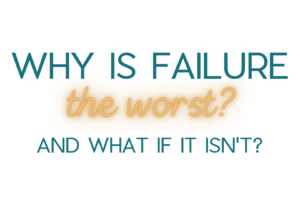Genuine apology is one of the most powerful things we can give a person, but if we’re honest, it’s so hard to do sometimes. But if we all fail, as we’ve been talking about lately in this space, then we all fail others at some point. Whether it’s something major or minor, if our failure affects another person, we need to be ready to apologize.
Apologies are difficult, though, because we fear they make us look weak or vulnerable. We may feel embarrassed and our pride is hurt. Genuine apologies require humility, a humility that is considerate of others and graciously makes room for mistakes. This kind of humility realizes our shared humanity, our shared potential to fail. This kind of humility is okay with saying, “I was wrong.”
An apology doesn’t have to be this huge issue. Instead, it needs to be our normal. We need to be able to recognize when we’ve hurt someone or done something wrong, and we must be willing to admit it. Spouses, coworkers, friends, pastors, parents, and leaders. We all need to make apologizing our new normal.
Sit for a moment and think about the last time someone apologized to you. How’d you feel? Imagine how your apology can affect someone else. Apologies can heal broken relationships, repair minor and major damage, make room for trust and safety, and connect us. However, they must be genuine to bring about that kind of healing and connection.
What is genuine apology?
Genuine apologies aren’t just empty words. Genuine apology is repentance— a turning away from wrong and an intentional change in behavior. It’s, “I’m sorry, and I’ll do my best to never do this again,” and then actually meaning it. Apologies are meaningless when words are spoken and no action is taken.
Genuine apology is not defensiveness. It’s not, “I’m sorry, but you shouldn’t have said or done …….” It’s not, “I’m sorry, but you know how I am,” or anything like that. It’s meekness— a compassionate consideration of how your actions negatively affected another person. It’s “I’m sorry.” Not “I’m sorry, but ….”
Genuine apology is never manipulative. Sometimes we only apologize just to keep the person around, so they won’t leave us or continue being upset with us. Our apologies then become a manipulative tactic to maintain some control over the relationship. We can also use apology to manipulate another person to apologize themselves (maybe for something they didn’t do) or to feel bad for us and overlook our wrong. It can sound like this: “I’m the worst person ever. I screwed up. I’ll always be a screw up. You don’t deserve someone like me.” This type of apology is looking for the other to respond like, “No, you’re not a screw up. It’s okay. Let’s forget this happened and move on.” If it’s true, an apology won’t be manipulative.
Genuine apology isn’t people-pleasing. Sometimes people apologize for things they shouldn’t because they are trying to keep the peace or act how they believe someone wants them to act. They say they’re sorry for feeling a certain way or crying in front of you or for something they didn’t do. They apologize for speaking their mind or stating their opinion, even if it’s done with respect to others. It’s a form of false humility. They want to make others happy or feel comfortable, so if they fear they are doing the opposite (or the situation itself is uncomfortable), they think an apology must be the correct reaction. These apologies are also meaningless because true apology is not false humility like this, only coming out to make another person like them or feel happy with them.
Instead, true and honest apology is simply acknowledging you were wrong out loud to another person. It’s just like repentance in the presence of Jesus. But in order for us to do this, we’ve got to be aware of when we fail another person. We have to pay attention to our actions and our words and how others respond to them. We need to be aware of how others feel and what they need (not in a people-pleasing way, just a kind and compassionate way). And if they tell us we’ve hurt them or we can tell by their nonverbal cues they are upset, we can lean in, and ask, “Have I said or done something wrong? I want to know so I won’t repeat that mistake.” Or we simply say, “I’m sorry. I was wrong.” It’s amazing what statements like this can do. Let’s be people who normalize genuine apology, who are willing to admit their wrongs and make necessary changes to avoid hurting others as much as we can in the future.
Our apologies may not do what we hope, and the outcomes may not be great, because relationships involve two people. The other person is responsible for how they respond and what they do with your apology. The only thing in your control is how you treat them. They may accept your apology, and they may not. Let’s have hope for restoration, but let’s also remember the outcomes aren’t up to us.






Recent Comments